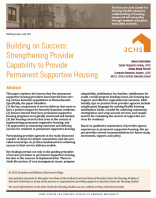Building on Success: Strengthening Provider Capability to Provide Permanent Supportive Housing
This paper explores the lessons that five permanent supportive housing providers have learned from serving various homeless populations in Massachusetts. Specifically, the paper identifies: (1) the key components of service delivery that seem to have a positive impact for formerly homeless residents; (2) lessons learned from how permanent supportive housing programs are typically structured and funded; (3) fair housing concerns that arise in the context of implementing permanent supportive housing; and (4) approaches to measuring outcomes and defining success for residents in permanent supportive housing.
Participating provider agencies in the study discussed number of issues for deeper examination and also provided several tips on practice fundamental to achieving success in their service delivery models.
Key findings pertain not only to the guiding principles of services provision in permanent supportive housing, but also to the nuances of implementation. These include discussions of case management issues, program adaptability, stabilization for families, stabilization for youth, overall program funding issues, fair housing law support, and effective organizational outcomes. Additionally, tips on practice from provider agencies include sample grant language for seeking flexible housing stabilization funds, a model for achieving community reintegration and wrap-around services, and sample metrics for evaluating the success of supportive services for residents.
Based on qualitative examination of provider agency experiences in permanent supportive housing, this paper provides several recommendations for future study, assessment, support, and policy.

